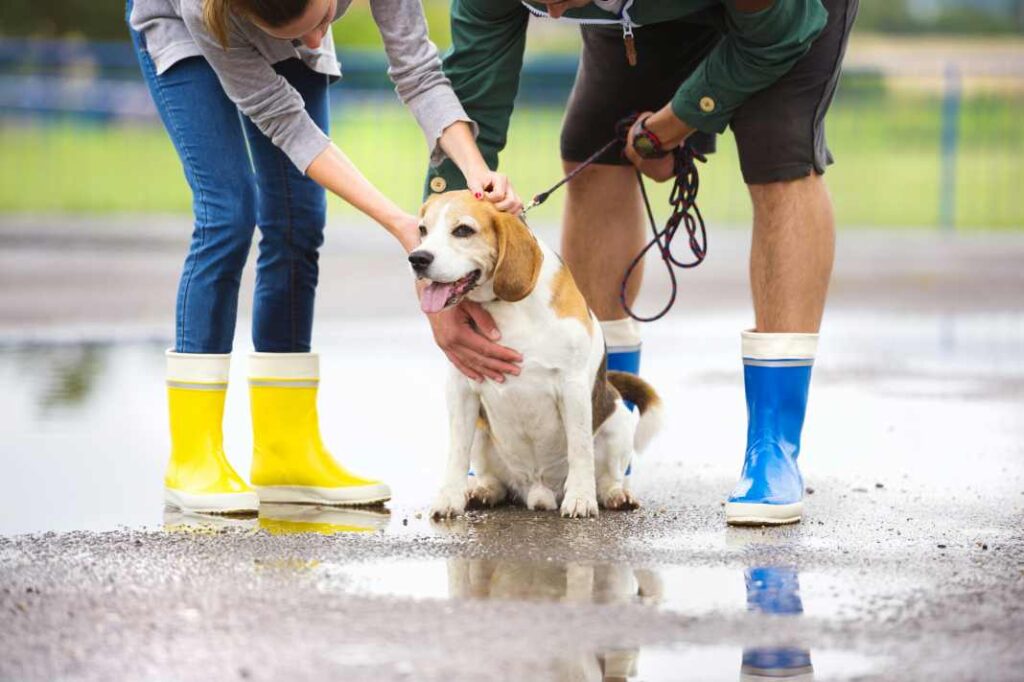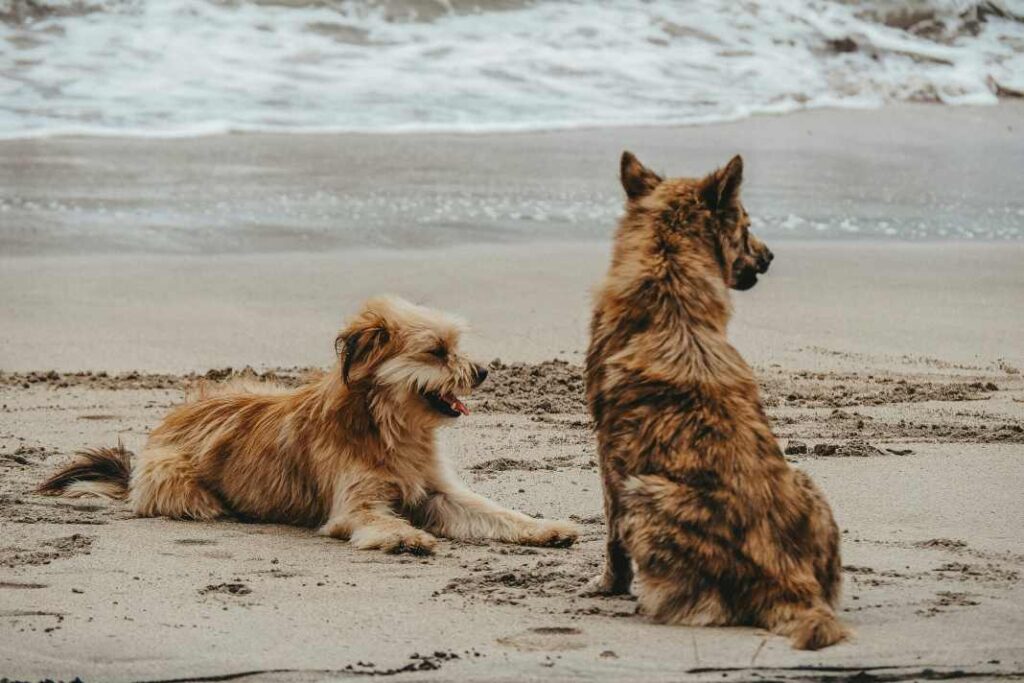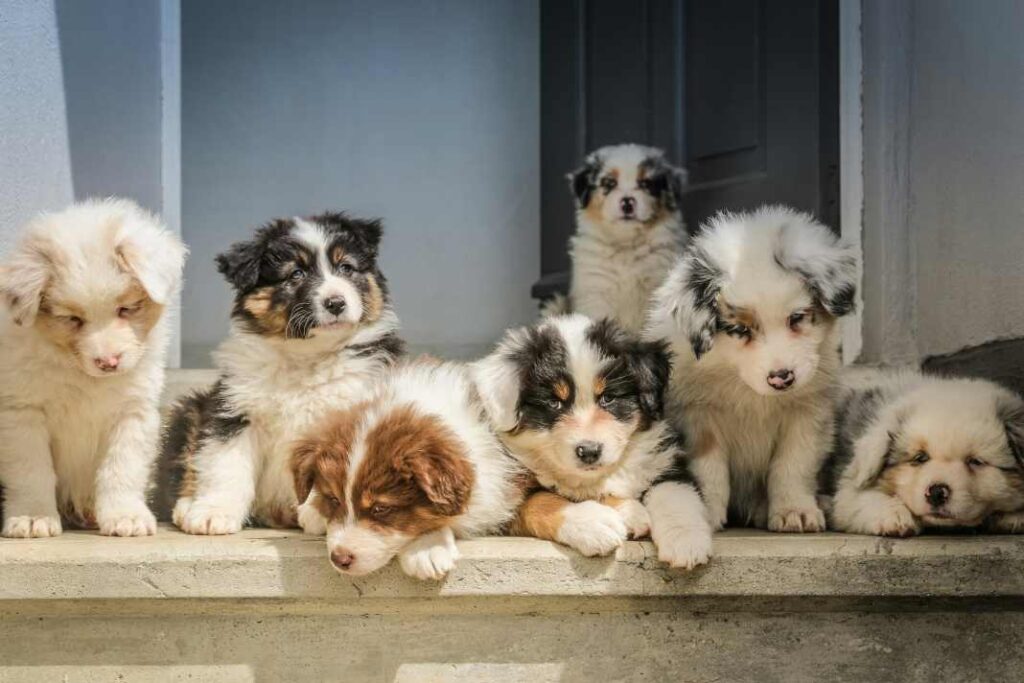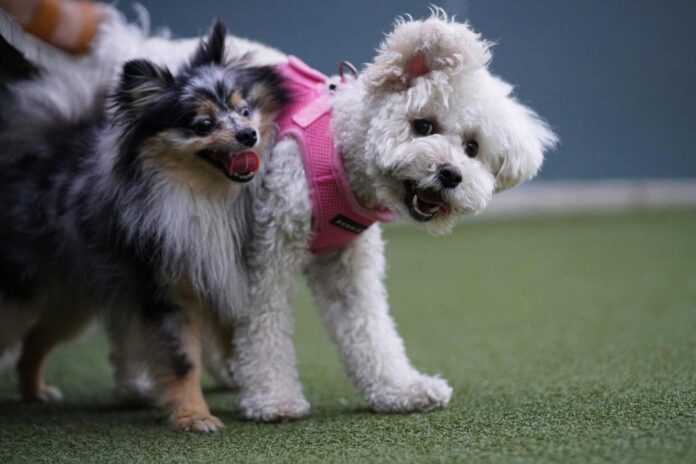A comprehensive guide to socializing your dog, including the importance of socialization, when to start, tips for success, common mistakes to avoid, benefits of well-socialized dogs, and techniques and activities for socialization.
Click here for Expert Videos to Stop Dog Behavioral Problems!
Introduction to the Importance of Dog Socialization
This guide to socializing your dog is more than just a checklist item for new pet parents; it’s a foundational aspect of raising a well-adjusted, happy, and confident dog. Early socialization, especially between three and 12 weeks of age, is crucial.
During this period, puppies are particularly receptive to new experiences, which can significantly influence their future behavior and temperament. For instance, puppies introduced to a variety of people, animals, and environments during this critical window tend to develop into adult dogs that are more sociable, relaxed, and less prone to behavior problems.
Moreover, well-socialized dogs enjoy a broader range of experiences and interactions, leading to a richer life. These dogs can accompany their owners on adventures to parks, outdoor cafes, and friends’ homes without stress or fear, creating a more harmonious living environment for everyone involved.
An example of the benefits of socializing your dog is seen in dogs that regularly interact with children from a young age; these dogs are often more patient and gentle with kids.
The Importance of Dog Socialization
Socializing your dog is not just about preventing behavioral issues; it’s also about enhancing your dog’s quality of life. A well-socialized dog is confident and less fearful in the face of new situations or environments, which contributes significantly to their overall well-being.
For example, a dog that has been exposed to various sights, sounds, and surfaces will likely be more adaptable when encountering something unfamiliar, reducing the likelihood of fear-based reactions or aggression.
This adaptability also extends to the dog’s family, offering peace of mind to the owner. Knowing that your pet can handle a variety of encounters effectively reduces anxiety for both the dog and their human companions, leading to a more relaxed and enjoyable relationship.
An illustrative case is a dog accustomed to grooming and veterinary visits from a young age, which tends to be more cooperative and calm during these sometimes-stressful situations. Dog socialization is about making your dog comfortable around other dogs and new people.

When to Start Socializing Your Dog
The adage “the earlier, the better” holds true for socializing your dog. The critical window for puppy socialization is between three and 12 weeks of age, a time when they are most open to learning and absorbing new information. Starting socialization efforts during this period can set a solid foundation for your dog’s behavior and interactions in the future.
However, it’s important to approach socialization with care, especially before a puppy’s vaccinations are complete. Safe and sensible interactions, such as carrying the puppy to observe the outside world or inviting vaccinated, friendly dogs to your home, can offer beneficial experiences without undue risk.
For shy puppies, extra patience and gentle encouragement are key. Gradually introducing them to new experiences can help build their confidence without overwhelming them.
Tips for Successful Dog Socialization
Socializing your dog successfully hinges on positive reinforcement and gradual exposure to a wide range of stimuli. Rewarding your dog with treats or praise for calm and curious behavior during new encounters reinforces that exploration and friendliness are beneficial.
For instance, introducing your dog to different types of people, animals, and environments in a controlled, positive manner can significantly enhance their comfort and behavior in diverse situations. Strategies for positive dog socialization on walks include gradual exposure and positive reinforcement.
One practical approach is organizing play dates with other well-behaved dogs, which can be an excellent way for your pet to learn appropriate social cues and behaviors in a safe setting. Similarly, exposing your dog to various environments, like busy streets, quiet parks, and different surfaces, can help them become more adaptable and less likely to exhibit fear or anxiety in new situations.

Common Mistakes to Avoid During Dog Socialization
A common pitfall in dog socialization is overwhelming the dog with too much too soon, which can lead to fear and anxiety. For example, taking a shy puppy into a crowded, noisy environment can be too stressful, potentially leading to negative associations with social situations.
Another mistake is failing to recognize signs of stress such as panting, pacing, or avoidance behaviors, which indicate that the dog is uncomfortable and needs a break from the socialization effort.
Inconsistency in socialization practices can also hinder a dog’s progress. A consistent approach, where positive experiences are regularly and gradually introduced, is crucial for building confidence and comfort in new situations.
Benefits of Well-Socialized Dogs
The benefits of having a well-socialized dog are manifold. Such dogs exhibit less fear and anxiety in new situations, making them more adaptable, enjoyable companions. They tend to have better impulse control and are less likely to react aggressively when faced with unfamiliar circumstances.
Moreover, well-socialized dogs are better at interacting with other animals, significantly reducing the risk of conflicts. This makes activities like visiting dog parks or simply walking in a busy neighborhood much more pleasant and stress-free.
Socializing Adult Dogs: It’s Never Too Late
Contrary to popular belief, adult dogs can also be successfully socialized. It requires patience, consistency, and the use of positive reinforcement techniques, but changing an adult dog’s behavior and comfort level with new experiences is entirely possible. The process involves gradually exposing the dog to new environments and experiences, allowing them to acclimate at their pace.
Building trust and confidence through positive interactions is key. For example, introducing an adult dog to new people in a calm, controlled environment, where positive behaviors are rewarded, can help overcome previous negative experiences or fears.
Dog Socialization Techniques and Activities
Dog socialization can be both fun and effective through games and structured activities. Engaging in socialization games, such as fetch or hide and seek, provides mental stimulation and helps dogs learn to interact positively with their environment and others.
Agility courses can also offer a structured way to expose dogs to various obstacles and situations in a controlled manner, promoting confidence and social skills.
Enrolling in dog socialization classes or organizing play dates with other well-socialized dogs can further enhance a dog’s ability to interact positively with others. These settings provide valuable opportunities for dogs to learn appropriate social cues and behaviors under the guidance of professionals, promoting positive social behaviors in a variety of settings.
In summary, socializing your dog is a critical component of raising a happy, well-adjusted pet. Starting early, using positive reinforcement, and avoiding common pitfalls can set the foundation for a dog that is confident, adaptable, and enjoys positive encounters with both humans and other animals.
Whether you’re working with a puppy or an adult dog, it’s never too late to improve their socialization skills, enhancing both their well-being and your shared quality of life.
Building a Confident Companion: Socialization Tips for Your Growing Puppy

Socialization tips for your growing puppy – Learn the importance of socializing your dog early, recognize signs of aggression, and discover effective training techniques to prevent aggression in puppies, ensuring a well-socialized and balanced companion.
Continue reading: Socialization Tips for Your Growing Puppy
Unlocking the Benefits of Early Socialization: Boosting Your Dog’s Well-being and Contentment

Discover how socializing your dog early can enhance your dog’s behavioral responses, foster immune system development, and contribute to their overall well-being.
Continue reading: Unlocking the Benefits of Early Socialization




